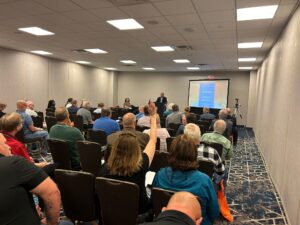Senate approves juvenile justice reform bills
 A portion of the 20-bill package to make sweeping reforms to the juvenile justice system, and which is backed by MAC, gained approval in the Michigan Senate this week. The Michigan House had planned action on the bills but did not take any.
A portion of the 20-bill package to make sweeping reforms to the juvenile justice system, and which is backed by MAC, gained approval in the Michigan Senate this week. The Michigan House had planned action on the bills but did not take any.
Senate Bills 418-423, 424, 425, 426, 427, 428-429, 430-431 and 432-437 are a result of the Michigan Task Force on Juvenile Justice Reform’s recommendations provided last July. SBs 418, 421, 425, 426, 428, 429, 431, 432, 435 and 436 were approved on Thursday. It is expected that the House will approve the remaining bills in the package that the Senate did not address. The House bills are HBs 4624-43.
The Task Force on Juvenile Justice Reform was established in 2021 and tasked with assessing Michigan’s juvenile justice data and identifying ways to improve the system. Two county commissioners served on the Task Force, each nominated by MAC. Alisha Bell of Wayne represented a county commissioner from a county with a population over 100,000, and Marlene Webster of Shiawassee represented a county commissioner from a county under 100,000 in population. Rep. Sarah Lightner, R-Jackson and a former county commissioner, also served on the panel.
The task force discovered several challenges to strengthening public safety and improving outcomes for youth. This led to the set of 32 recommendations provided to the Legislature last year. The recommendations would improve community safety, reduce disparities and improve youth outcomes.
SB 418, by Sen. Sylvia Santana (D-Wayne), enhances the County Child Care Fund (CCF) by establishing a minimum framework of juvenile justice best practices statewide, including the use of risk screening and assessment tools. The best practices will be supported by an increase in the reimbursement rate for community-based services from 50 percent to 75 percent, including 17-year-olds. These changes are essential to ensuring counties have the resources to implement and utilize these approaches. The reimbursement rate for residential services will be 50 percent, including the 17-year-old population.
SBs 419–423 and HBs 4625-29 require the consistent use of validated screening and assessment tools to enable more objective decision-making and allow agencies to better match youth to appropriate supervision and services, reducing their likelihood to recidivate. The bills also expand the Diversion Act so that all offenses, with an exception for youth committing a specified juvenile violation, are eligible for pre-court diversion, based on the use of a risk-screening tool and other factors, and limit the time that a youth can be placed on pre-court diversion, unless the court determines that a longer period is needed. While diversion eligibility would be expanded, judicial discretion remains.
SB 424 and HB 4630, by Sen. Sue Shink (D-Washtenaw) and Rep. Sarah Lightner (R-Jackson), respectively, would expand the Michigan Indigent Defense Commission to include development, oversight, and compliance with youth defense standards in local county defense systems. MAC has worked to ensure there would be no increase in the local share for MIDC services, that 40 percent of the total grant amount would be received upfront and that partially indigent reimbursements will remain.
If enacted, this legislation would take effect Oct. 1, 2024.
MAC supports this package.
For more information on this issue, contact Samantha Gibson at gibson@micounties.org.
Solar and wind siting legislation sparks contentious hearing
 Outspoken residents and frustrated committee members did not hold back during a tense House Energy Committee hearing Wednesday on solar and wind siting legislation, bills that are opposed by MAC.
Outspoken residents and frustrated committee members did not hold back during a tense House Energy Committee hearing Wednesday on solar and wind siting legislation, bills that are opposed by MAC.
House Bills 5120, by Rep. Abraham Aiyash (D-Wayne), 5121 and 5123, by Rep. Ranjeev Puri (D-Wayne), and 5122 by Rep. Phil Skaggs (D-Kent) aim to usurp local control of siting and permitting for renewable energy facilities and grant the authority to the Public Service Commission (PSC).
The hearing kicked off with the sponsors speaking to the merits of their bills. They emphasized the governor’s efforts to transition toward 100 percent renewable energy and a Senate package that would implement her goals by 2040. Aiyash explained the bills would help to expedite the transition and expand clean energy production in Michigan.
Those pushing for the legislation include the governor’s team, environmentalists and solar development companies. It comes after lawsuits between developers and township officials. Should the PSC take control of siting for renewable energy facilities, developers would no longer need to interface with local units of government, doing business directly with the state.
Republican members of the committee questioned Aiyash at length about the elimination of community input, the effect on farmland capacity and the ways in which rural and urban communities will be impacted differently should this legislation pass. Even democratic members shared concerns about how broadly the legislation was drafted. The audience, primarily made up of opponents, could be heard cheering and booing on occasion.
MAC opposes the package and was set to testify, but the committee hearing ran out of time after an hour and a half. Committee Chair Scott (D-Oakland) told the press afterward that it is possible there will be more hearings, but that she is still deciding whether she supports the bills. Should another hearing be scheduled, MAC is prepared to speak out against the pre-emption of local control.
MAC has an email advocacy campaign available on this issue and a resolution template for counties to adopt.
To date, 23 counties have adopted resolutions to oppose the legislation in its current form: Alcona, Bay, Cass, Chippewa, Clinton, Crawford, Hillsdale, Huron, Ionia, Iosco, Iron, Lapeer, Mason, Mecosta, Menominee, Missaukee, Newaygo, Ogemaw, Ontonagon, Osceola, Sanilac, St. Clair and Tuscola.
Another six counties have advised MAC of their intention to adopt such resolutions: Alger, Berrien, Branch, Isabella, Manistee and St. Joseph.
If your county has adopted a resolution or plans to do so and is not on these lists, please contact Amanda Despins at despins@micounties.org.
For more information on this issue, contact Madeline Fata at fata@micounties.org.
PPT reimbursement bills head to governor
 Legislation to create a reimbursement process for local governments who will lose money due to Personal Property Tax exemptions this year passed both chambers and now awaits the signature of the governor.
Legislation to create a reimbursement process for local governments who will lose money due to Personal Property Tax exemptions this year passed both chambers and now awaits the signature of the governor.
House Bills 4553 and 4554, by Rep. John Fitzgerald (D-Kent) and Rep. Denise Mentzer (D-Macomb), respectively, and Senate Bill 331, by Sen. Kevin Hertel (D-Wayne), received bipartisan support this week. All three bills reflect a key MAC priority for 2023.
MAC began pursuit of legislation after the Legislature, in December 2021, expanded the PPT exemption for businesses from $80,000 in true cash value exemption to $180,000. This move created an estimated $75 million annual loss for local governments.
Because this exemption is not based on the value of property initially exempted in 2014 with the large PPT overhaul legislation, calculating the loss for each county and community needs to be based on a different formula. It took more than a year to determine the best mechanism and methodology for calculating the reimbursements, as reflected in the current bills.
The bills also carve out $75 million from the state’s use tax to fund the reimbursement.
The expansion of the PPT exemption is effective this year and without enactment of these bills, locals would be left with a shortfall. MAC anticipates the governor will sign the bills and the promise of reimbursement will be fulfilled.
For more information on this issue, contact Deena Bosworth at bosworth@micounties.org.
Binding arbitration expansion grinds its way toward passage
 Legislation to extend binding arbitration to county correctional officers took another step toward enactment this week, despite opposition from MAC and others.
Legislation to extend binding arbitration to county correctional officers took another step toward enactment this week, despite opposition from MAC and others.
House Bill 4438, by Rep. Kelly Breen (D-Oakland). was approved by the Senate Labor Committee unanimously on Thursday. A substitute was adopted during the committee process to include all Michigan Commission on Law Enforcement Standards (MCOLES)-certified law enforcement officers in binding arbitration, adding officers from universities and community colleges.
MAC has long opposed any expansion of binding arbitration to other bargaining units due to the cost of the process, the long-term liabilities associated with third-party decisions and the unequal treatment such a system provides to those bargaining units. The Michigan Public Employment Relations Act already provides for bargaining rights without tying the hands of the county in binding arbitration.
MAC submitted a letter to committee members expressing these concerns. However, the current Legislature has repeatedly demonstrated strong support for unions and collective bargaining units. HB 4438 has been referred to the Senate floor for a final vote before likely advancing to the governor’s desk for signature.
For more information on this issue, contact Madeline Fata at fata@micounties.org.
House committee reviews plan for court reporter fee increase
![]() This week, the House Criminal Justice Committee heard testimony on House Bill 5046, sponsored by Rep. Nate Shannon (D-Macomb). This legislation would increase wages for court reporters and recorders. The bill would increase the amount a court reporter or recorder would receive from $1.75 to $3.75 per page on original transcript, and 90 cents per page for each copy.
This week, the House Criminal Justice Committee heard testimony on House Bill 5046, sponsored by Rep. Nate Shannon (D-Macomb). This legislation would increase wages for court reporters and recorders. The bill would increase the amount a court reporter or recorder would receive from $1.75 to $3.75 per page on original transcript, and 90 cents per page for each copy.
MAC opposed this legislation in committee; however, MAC supports the increase in fees for court reporters and recorders. We are continuing to work with the bill sponsor to address issues this legislation may pose for county budgets.
For more information on this issue, please contact Samantha Gibson at gibson@micounties.org.
House approves additional judgeships in Kent and Macomb counties
![]() New judgeships could soon exist in Kent and Macomb counties after the House passed House Bills 4823 and 4920, by Rep. Doug Wozniak (R-Macomb) and Rep. John Fitzgerald (D-Kent), respectively. HB 4823 would add a probate court judge in Macomb County, while HB 4920 would add a district judge in Kent County.
New judgeships could soon exist in Kent and Macomb counties after the House passed House Bills 4823 and 4920, by Rep. Doug Wozniak (R-Macomb) and Rep. John Fitzgerald (D-Kent), respectively. HB 4823 would add a probate court judge in Macomb County, while HB 4920 would add a district judge in Kent County.
The Macomb Probate Court now has two probate judges, so HB 4823 would add a third slot. HB 4920 would add a judge to the 63rd District Court in Kent County. However, the Kent seat would still need approval from the Kent County Board of Commissioners, even after any legislation is signed into state law. After approval from the Board of Commissioners, an election would have to be held in 2024 to elect a new judge.
MAC supports this legislation.
For more information on this issue, contact Samantha Gibson at gibson@micounties.org.
Counties reminded to make canvasser appointments
 As Oct. 16 approaches in what is an odd-numbered year, county boards are reminded of their responsibilities to make appointments to their Board of County Canvassers.
As Oct. 16 approaches in what is an odd-numbered year, county boards are reminded of their responsibilities to make appointments to their Board of County Canvassers.
As noted in a new legal update from the firm of Cohl, Stoker & Toskey:
“The Board of County Canvassers is a four-member board established in every County to canvass election results and conduct recounts. MCL 168.24a(1), (2). Members of the Board of County Canvassers are appointed for four-year terms of office beginning on Nov. 1, following their appointment. MCL 168.24a(7).
“Members of the Board of County Canvassers must be qualified electors of the County. However, no elected official is eligible for membership on the Board of County Canvassers. If any member of the Board of County Canvassers, during their term of office, becomes a candidate for any elective public office, their seat on the Board of County Canvassers becomes vacant. MCL 168.24b.
“The County Board of Commissioners must make its selection within 10 days of convening its annual meeting. MCL 168.24c(3). The Board of Commissioners has a narrow 10-day window of opportunity to appoint two members to the County Board of Canvassers for a new 4-year term commencing on November 1 of an odd numbered year. MCL 168.24c(3). That 10-day window of opportunity commences upon the convening of the County Board’s annual meeting, which must be held each year after Sept. 14, but before Oct. 16. MCL 46.1(1).”
See the complete memo from the firm by clicking here.
Check out conference videos on MAC’s YouTube channel

Ed Noyola of CRA answers a question during the road funding workshop on Oct. 1, 2023.
MAC members are encouraged to visit our YouTube channel, where you will find a growing set of videos from the 2023 Annual Conference held earlier this month.
In the first wave of videos from the conference, check out segments of the two-day workshop on road funding and spending put on by the County Road Association, a MAC affiliate.
In coming days, you also will find at the link videos from plenary sessions, including the MAC Legislative Update, and the inaugural address of 2023-24 MAC Board President Jim Storey of Allegan County.
MAC’s YouTube channel also is where you can find episodes of Podcast 83, special webinar videos and more.
Other 2023 Annual Conference resources — such as presentations from workshops, handouts and photos — can be found on the MAC website.
MAC conference attendees leave event with potential windfalls
 More than $90,000 in claims on property now held by the Michigan Treasury were established for attendees of the 2023 Annual Conference in Kalamazoo this month.
More than $90,000 in claims on property now held by the Michigan Treasury were established for attendees of the 2023 Annual Conference in Kalamazoo this month.
A booth at the conference, staffed by a Treasury official, assisted attendees in using the state’s unclaimed property database. The results were striking:
- 88 searches performed
- 41 claims established, totaling $90,225
- 47 percent“hit” ratio (average hit ratio is 33%)
“We always tout the value of our major events, but this gives new meaning to the term,” said Stephan Currie, MAC’s executive director. “We appreciate the cooperation of the Treasury Department in making this service available to our members.”
Don’t be surprised to see the Treasury booth at a conference next year, so plan accordingly!
 Staff picks
Staff picks
- How landfills work (Michigan Department of Environment and Great Lakes)
- Marquette County organizations secure $50K for housing specialist (Mining Journal)
- State of Michigan ARP Funding Dashboard (Michigan Department of Technology, Management and Budget)
- How Crisco toppled lard – and made Americans believers in industrial food (The Conversation)
